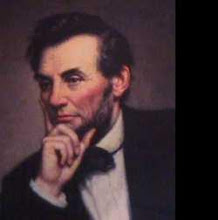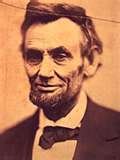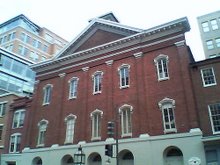

Keeping the railroad running was crucial to the success of Lincoln’s agenda. The Baltimore and Ohio Railroad was the Union’s main supply line to Wheeling on the Ohio River and to the West.
Lincoln’s "silent partner" in all this was none other than Johns Hopkins, founder of the university and hospital at Baltimore. Hopkins, Financial Director of the B&O, along with its President John Work Garrett, went to great lengths to keep the Railroad running during the Civil War.
A Maryland banker and financier, Hopkins was also an abolitionist and supporter of Lincoln in a state which did not vote for Lincoln as the US President. One of the first campaigns of the Civil War was planned at his summer estate, Clifton. At the beginning of the Civil War, Hopkins wrote a letter to Lincoln, requesting the President to keep troops under the command of General John Ellis Wool stationed in Maryland. Johns Hopkins signed this letter "your servant" and "friend" and it can be found in the holdings of the Library of Congress.
It’s no coincidence that much of the fighting in Maryland followed the B&O Railroad stops: Cumberland, Havre de Grace, Union Mills, etc. Realizing its crucial importance to the Union’s success, no fewer than nine Confederate military leaders sought to capture or shut down the B&O, including Stonewall Jackson, Jubal Early, Turner Ashby, John D. Imboden, Albert G. Jenkins, William F. Jones, John S. Mosby, Major Harry Gilmor and John H. McNeill.
Famous raids involving the B&O included "The Great Train Raid of 1861" ; the "Martinsburg Train Raid" and "Leesburg Train Raid," both in 1861 ; the "Romney Expedition" in 1862, the "Jones-Imboden Raid" in 1863 ; and the "Battle of Monocacy," and "Gilmor’s Raid," both in 1864.
Whew. No wonder those railroad men were tired.
To find out more about the life of Johns Hopkins, check out this great Wikipedia article: http://en.wikipedia.org/wiki/Johns_Hopkins. For info about John Work Garrett, see: http://en.wikipedia.org/wiki/John_Work_Garrett, and for more about the B&O Railroad, check this out: http://en.wikipedia.org/wiki/Baltimore_and_Ohio_Railroad












1 comment:
Nothing is more fun than blowing up railroad track!
Post a Comment